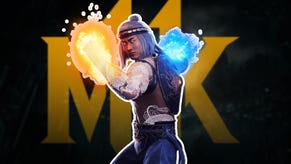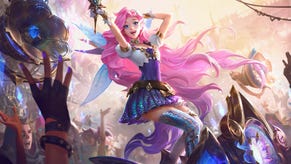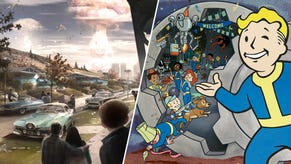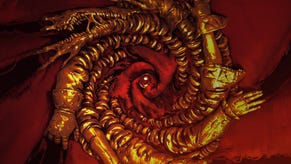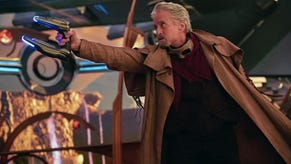Manami Matsumae, the Maestro of Mega Man
COVER STORY: We wrap up our Brave Wave profile with this conversation with one of the label's biggest draws: Mega Man and Shovel Knight composer Manami Matsumae.
This article first appeared on USgamer, a partner publication of VG247. Some content, such as this article, has been migrated to VG247 for posterity after USgamer's closure - but it has not been edited or further vetted by the VG247 team.
USG: So I noticed you worked on a lot of Game Boy games. That’s something I find very interesting – I’m trying to document the history of Game Boy, because so few people really take the time to look back at it. Were there any interesting experiences you had working with Game Boy games?
MM: So there was this one SunSoft game I composed for, The Adventures of Lolo.
USG: Oh, yeah, the HAL puzzle game.
MM: Yeah, interesting experiences, right? I was a composer for this game I went to HAL to program for this game, and at that time, [Satoru] Iwata was still just a programmer there. In the context of his recent passing, that was a meaningful game for me to have worked on, having worked together with Iwata-san.
USG: Did he actually work closely with that game specifically?
MM: He was the executive producer, so he was definitely a prominent or core member of that team.
USG: So the Game Boy was the early ’90s. By that point, you had the 16-bit systems like the Mega Drive and the Super Famicom, which had very powerful sound processors, and Game Boy was very simple. Did you find it difficult to sort of go back from working on arcade games and Genesis and Super Famicom to work on the Game Boy?
MM: Yeah, I mean, the Game Boy you could say was primitive, I guess relative to the home consoles that are out at the time, but it was still actually quite different from developing for the Famicom. Some of the sounds would be – I don’t know if “fatter” is the right word, but richer or loaded. In general, it was a different process, and it was fun to work on Game Boy games. It was definitely not an awful thing for me to have to do.
USG: I see that you worked on Trip World, which is a really interesting game…
MM: Ah, Trip World! [laughs]
USG: …can you talk about that a little bit?
MM: Honestly, I don't remember too much about the development any more, but it was quite a good game.
USG: Yeah, it’s just a really different game. It’s very relaxing, with its – there’s very little fighting that you have to do, it’s really just kind of an experience. It’s really rare and expensive now, too.
MM: Wow! I think I have a copy. I have copies of every game I've worked on.
USG: Oh, you should hold on to that, then! Anyway, you worked on games for a long time and then it seems like around the year 2000, 2002 or so, you kind of trailed off. Was there a reason you got out of games?
MM: I had a child, that’s why. When my child finally grew up and didn’t require as much attention, that’s when I started getting back into it.
USG: Did you find that the nature of game music had changed in the time that you were away?
MM: The biggest difference I can describe would be the Hollywood-ization — you know, the hardware, the game consoles were getting more and more capable and more powerful, and the trailers that would accompany these games were also becoming more and more… how would you describe it...?
USG: Like film scores?
MM: Yeah, like more Hollywood-like, like epic and full of scenery, and then you had to make music that would match those trailers. That seemed to have happened when I was away. So yeah, that would be the biggest change to describe. I don’t know if it actually happened before then, or happened a little after, but timing wise, it seemed to have lined up with my sabbatical.
USG: Seems like the PlayStation 2 era, where that really happened.
MM: Yeah, and you know, that led to orchestrated music being very commonplace, very epic, grand music — you know, full productions, Hollywood-level stuff.
USG: But it seems like the games that you’ve worked on since you got back into music and composing have been more sort of that old school flavor. Has that been a deliberate choice, or is it just kind of chance?
MM: Yeah, indeed, some of the work I've been asked to do lately has been making music that’s catchy, and basically everything I had built my name on back in the NES era. I mean, those are all the requests that I've been getting. If I were asked to write an orchestra piece, I could probably do it, but that’s not what people are asking me to do. [laughs]
USG: Do you think that the style of music that you create and the work you do requires a certain talent that maybe not a lot of other composers have?
MM: I think anybody can do it. [laughs] Yeah, it’s not like you need some kind of special ability or special skill to do it.
USG: I guess that brings us to Brave Wave. What is your relationship with the company?
MM: Okay, so Mohammed Taher, the founder of Brave Wave who’s living in Kuwait now, had contacted me and asked me to make one song for an album that he was planning at the time. Although I guess there was kind of a game influenced context behind it, that project was not a video game, and Mohammed didn’t pose any specific limitations or direction as to what kind of music I could make, and I found that in particular very refreshing, you know? Finally doing something without that kind of limit, the limit that’s accompanying making music for games... When I worked on that project, I felt like – like in English, you'd say “like a new person,” almost? And that is what gave my the motivation to kind of go back and start tackling games again.
USG: I see. So how long have you been involved with the company?
MM: Three years?
Translator: Even I can’t believe it’s been three years! [laughs]
MM: [laughs] More like, “Already?!”
USG: So when you create projects for Brave Wave, does it still have that sort of freedom to it? Just do what you want?
MM: Yeah, I still feel that’s the case. There’s a lot of freedom, and it’s always refreshing to work with Brave Wave. I mean, I've been doing game soundtracks through Brave Wave as well, and that’s followed the convention for working with companies and not original albums, but in general, I feel very relaxed.
USG: Can you talk about the projects you’re working on now?
MM: The stuff I can talk about today are A Flat Kingdom, that’s a Mexican indie platforming game, and it looks very good. Heart Forth, Alicia, which was Kickstarted... I'm doing six songs for that; Cubot, which is actually at TGS now, with the 3D printable block amiibo-like things. Star Mazer, I did one song for that game. And I'm working on a solo album with Brave Wave. Plus miscellaneous collaboration work!
USG: Are you bringing a different approach to each of these projects? Do you find it difficult to jump from one style of game to another?
MM: Actually, it’s quite fun to work with different projects, because every project then has its own direction and every creator wants different things. I'm very accustomed to trying to meet their needs.
USG: You don’t find it difficult to change the way of thinking from one composition to another?
MM: Yeah, at this point, that’s definitely not something I've found. I guess in that sense, I've been in the industry long enough that I'm not going to suffer from a problem like that. [laughs]
Translator: She didn’t mention this herself, but by working with a lot of indie developers, you know, she’s been working on games since a lot of those people were children, right? So there’s a certain aura of seniority that she has, so if she dictates that something is a good idea, then usually they’ll listen, right? She doesn’t get too much dictation, and usually if there is, Brave Wave or me, we’re here to make sure that she understands that the developers understand what she wants as well.


